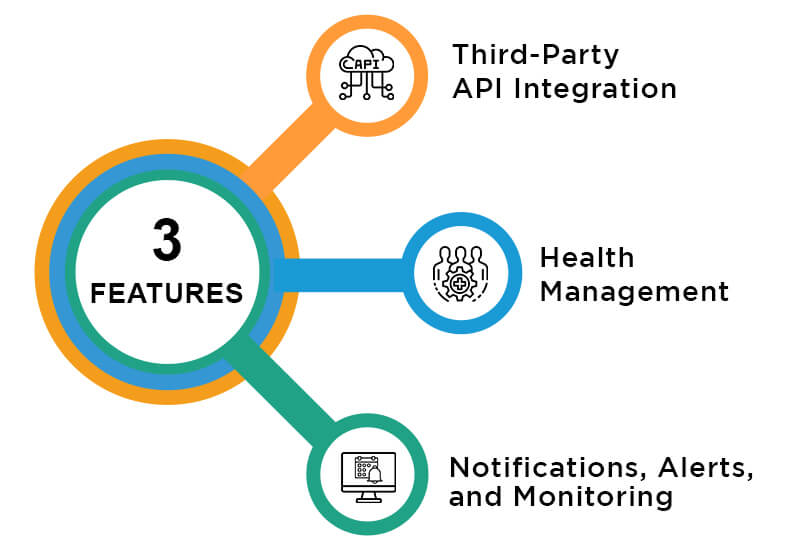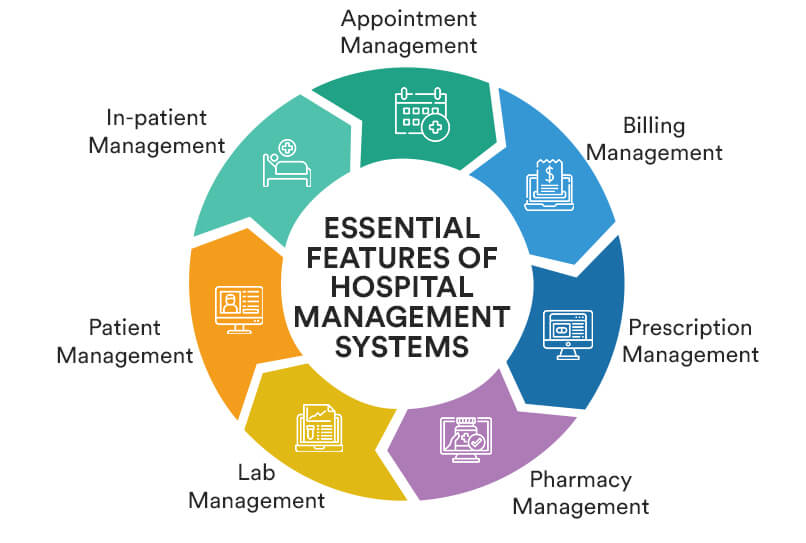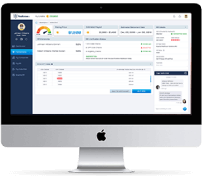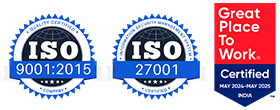Introduction:
Value-based care revolves around healthcare services that offer advanced capabilities and convenience for patients. With a pandemic raging in our midst, the need for hospitals to speed up and automate their processes has never been more urgent. A hospital information system software is designed for precisely this purpose. An integrated hospital information system accumulates healthcare and hospital management information and uses this information to aid healthcare providers in offering effective and superior caregiving. Executing a robust hospital information management system can streamline operations across multiple departments in the hospital, such as clinical, financial, OTs, labs, pharmaceutical, pathology, etc. It can further be integrated with mHealth applications for remote health management.
Modernizing healthcare involves implementing advanced technologies towards electronic health records and integrated healthcare systems. As hospitals look to incorporate these automated mechanisms into their system, a management information system in hospitals can do the job comprehensively. Apart from a higher quality of caregiving, hospital information system applications can automate management processes and reduce the tedious paperwork involved in patient record processing. Medical records management can be applied toward managing and maintaining patient details, keeping track of appointments, insurance references, and bill payments. Health information systems are designed to reduce time, costs and errors, and improve efficiency, security, and accessibility of data management.
The Need for Hospital Information Systems
As healthcare shifts its paradigm toward patient-centric caregiving, hospitals need to balance quality of care delivery with moderate costs while simultaneously tracking workforce performance and financials. Every hospital has a unique business model, and to keep all these dimensions effective, a customized management information system in hospitals is highly essential. A robust hospital management information system can provide actionable insights into the massive amount of data collected in the hospital.
Through the advanced capabilities of a clinical data analysis system, the hospital can analyze medical tests, diagnoses, lab reports, prescribed medications, and many data points on a single dashboard. A tailor-made hospital information system (HIS) can aid clinicians in making prompt and informed decisions about patient care and delivering them right on time. Every hospital must seek to identify their specific needs and understand various trends while choosing an information system in hospital automation. A careful choice of custom healthcare solutions will enable positive outcomes to improve the quality of health care provided in the hospital. Listed below are the many advantages offered by hospital information system software companies:
- Data Retrieval Capabilities
- Increased Healthcare Security
- Improved Operational Visibility
- Accurate Data Reporting
- Higher Quality Control
- Better Patient Management
- Easy Healthcare Accessibility
- Reduced Overall Costs
At OSP, we recently designed an integrated hospital management system with integrated care management that offered the following features:

1. Third-Party API Integration
a virtual health feature to support third-party integrations with electronic records and other healthcare CRM platforms. API promotes the user-friendly utilization of these integrations.
2. Health Management
virtual health tool to support viewing patient data from various sources from any smart device. Physicians can keep tabs on patient health through the real-time vitals and health status.
3. Notifications, Alerts, and Monitoring
hospital risk management for senior patients and those with chronic care needs. Physicians receive alerts and notifications of any changes or shifts in health conditions.
The Steps To Build a Hospital Management System
1. Find a Medical Software Development Company
This is the first step in creating a hospital information system for your organization. Healthcare software is a massive industry valued at several billion dollars and grows yearly. So, it is not surprising that several companies will offer both pre-built and custom hospital information management systems. In light of this, it becomes necessary to evaluate the company based on its track record and leadership.
Hospital executives looking for a hospital information system must research the medical software company’s products comprehensively. A good way to assess the competency of a health tech company is to view its clientele and its position in the market. This can be done by visiting hospitals where their healthcare information systems have been implemented and finding out specifics.
2. Get an Estimate
This is the phase after a company has been chosen to be the vendor for a hospital information system. The company offering the software platform would have to conduct a thorough requirements analysis to get a proper estimate. This would include knowing the size of the hospital, the list of features, deciding upon a custom-made or pre-built solution, and so forth.
Depending on these factors, the company’s project leads and the hospital’s executives would concur in negotiations and reach an agreement. This is where the healthcare software company would offer its estimate in terms of cost and deadline.
3. Develop Architectural Framework
The company will develop a framework for the hospital information system software. It would include a basic view of how the platform would appear and its functionality. In other words, the project engineers at the software company would design and finalize the wireframe of the software. This will provide perspective on the interface and a general feel for the hospital management system.
4. Decide on the Tech Stack
Based on the scope of the platform to be developed, it is necessary to choose the appropriate technology stack for development. It is generally recommended to use programming languages like Java or .Net. MySQL is suitable for the database if the hospital management and information system are implemented in a single organization. However, if several hospitals need to be brought under an encompassing platform, PostgreSQL might be better suited as it would support clustering.
5. Code the Software
This is the phase where the actual process of software development can be said to begin. The software programmers would undertake coding to build the software and add all the features as part of the process. The development usually happens by dividing all the programmers into teams and giving each team a target to achieve within a timeframe. Each team would code one part of the hospital management information system software. Subsequently, all the separate parts of the solution would be merged to get one comprehensive software platform.
6. Testing
After the healthcare information system has been developed, it is tested rigorously to ensure that it works as intended. Testing is carried out as per established standards and against pre-determined parameters for checking data security and compliance. Bugs or errors discovered during testing are documented and rectified. Subsequently, there is another round of testing to ensure that all the features of the hospital information system work as planned.
After the development process has been completed and the hospital information system tested, it is deployed at the hospital. After the software’s installation on the systems, there is a period of comprehensive training for the staff to get them acquainted with the platform. This can take anywhere from a few days to a few weeks, depending on the size and scale of the management information system in the hospital.
Essential Features of Hospital Management Systems

1. Appointment Management:
Online appointment scheduling helps automate the appointments, follow-ups, and any special procedures for each patient. Hospital information system companies can program the online appointment scheduling module to help hospitals handle appointment management, bulk cancellation, rescheduling of appointments, and managing scheduling history. Patients can easily book their physical or remote appointments, and the doctors get the patient’s complete health history before the visit through healthcare provider solutions. The hospital information management system software can be customized to help patients book their lab tests and radiology appointments through patient engagement systems. A direct impact on patient waiting time will enhance patient engagement and trust in hospital management.
2. Billing Management:
Billing automation is a necessary process to enhance hospital profitability. Healthcare interoperability solutions can offer an advanced billing module in hospital information systems applications to provide an efficient and error-free billing process. The technology is geared toward capturing every billable service administered for a patient without losing any data and ensuring no loss of revenue. The billing module can be customized to accommodate different billing scenarios based on the claim rules of each hospital. It can help to reduce discretion at the billing desk and ensure that all charges are captured. Automatic posting of medical charges related to different services such as bed charges, lab tests, medicines, consultant’s fees, food, beverage, etc., can be handled efficiently by the billing module in the hospital management system.
3. Prescription Management:
Based on the individual requirement of the hospital, hospital management information system software can offer customized architectures that maintain secure communications of e-prescriptions between various caregiving aspects of the patients, their relative pharmacies, and claims agencies for holistic integration and accurate process flow. This e-prescribing procedure empowers the entire process flow of the prescription system and increases patient satisfaction due to error-free dispensing and billing through secure electronic data exchange. All patient-related data on the system can be securely protected through HIPAA compliance.
4. Pharmacy Management:
Hospital management information system software can offer document management modules to document and manage every associated patient’s Electronic Health Records (EHR) and Electronic Medical Records (EMR), which includes doctor’s notes, supporting documents, scans and x-rays, claims, and billing-related information, and demographic related information. Furthermore, the pharmacy data management system works toward incorporating audit requirements and updates and modifications related to billing. Hospital management information systems can combine the pharmacy’s compounding skills and multiply them through integration with healthcare automation to create customized medication packages for each patient, according to their individual needs. The success of such a method is crucial to the overall revenue generation of the hospital, as it is a means of offering patients a value-based caregiving experience that addresses their personalized requirements.
5. Lab Management:
A Laboratory Information Management System (LIMS) is a vital hospital management information system software module. Clinical informatics solutions can be applied towards lab and test management that can log lab reports for each patient, upload reports and write findings, and manage the hospital blood bank. These technologies can be integrated into the clinical information system to streamline the workflow process for every patient that registers with the hospital. When the physician advises a specific list of tests, the same is updated in healthcare information systems and directly received by the diagnostic laboratory. This interfacing helps to decrease errors caused by the staff. Since all the data is fed into the clinical information system, one can retrieve and review past medical reports of patients at any time.
6. Patient Management:
A patient information system in a hospital is a core component of the health information system. Population health management can be applied to match the unique requirement of hospitals to help them manage patient registration, demographic data and keep patient data updated while actively preventing duplication of information. It can prove helpful to patients to book data online, staff can register their details, and hospital physicians can view their reports with a single and well-integrated platform. Through cloud computing in healthcare, healthcare information systems can include a unique patient ID for tracking visits, automatically verifying patients’ benefits eligibility using secured EDI, and hassle-free patient management digitization.
7. In-patient Management:
Healthcare information systems can be built to offer an in-patient management module for hospitals to help ward staff manage patient traffic and their bed allocation within the hospital. In-patient management is vital to enhance staff efficiency through automation by saving time and hassle of patient management. Healthcare analytics solutions can automate the day-to-day administrative activities and offer instant access to other avenues of information systems in healthcare, which leads to better patient care. It provides comprehensive data about the admission of patients and ward management, availability of beds, agreement preparation, estimation, planned and emergency admission. In-patient management also deals with advanced ward management needs, such as shifting from one ward to another, availability of beds, surgery, administration of drugs, charge slip, nursing notes, etc.
Components of a Hospital Information System
A hospital information management system is a large software platform with numerous features and functions. Unsurprisingly, there are bound to be multiple constituent modules for all the various functions of a hospital system software. Let’s look at some of them in greater detail –
Core System
This component consolidates all the data across the hospital system platform, including every department.
Financial Module
This module is used mainly by members of the financial management team or the hospital’s chief financial officer. It includes functions for capturing data regarding reimbursements, out-of-pocket payments, costs, and so forth. In other words, this component facilitates the financial management of a hospital and is a vital tool for the overall administration.
Human Resource Management
Managing human resources at large hospitals is a large feat. Senior managers must oversee shifts, overtime, vacations, and other aspects concerning doctors, nurses, and other non-clinical staff. The human resource management module enables managers to track employee activities and schedule their work efficiently to prevent employee burnout or avoid situations where the hospital is short-staffed. Since wages form a major overhead, this module helps managers optimize existing staff without over-staffing or under-staffing.
Medical Documentation
Hospitals, like private corporations, must function efficiently and manage their resources well. Documentation enables hospitals to track and monitor inventory, finances, personnel, patient details, treatments, and other day-to-day clinical and non-clinical workflows. Documentation enables periodic audits and enables hospitals to be compliant with government regulations.
Asset Tracking
Managing a hospital’s inventories is vital for it to be able to serve its patients. Medical equipment, its components, syringes, vials, gloves, masks, scrubs, and other paraphernalia are important for everyday operations. The usage of each of these items needs to be tracked and monitored meticulously to ensure that hospitals never run out of them. The asset tracking module of a hospital information system is an important tool for day-to-day management. It helps manage inventory, order new items, track expiration dates, manage orders, and so on.
Medical Transportation
Hospitals must manage their fleets of ambulances and other non-emergency transportation. This is crucial if hospitals need to assist people during emergencies like heart attacks, gunshots, childbirth, etc. This component of a hospital management system enables administrators to track and manage the fleet of vehicles and ensure that they are always ready to serve patient needs.
Custom Solution Vs. Pre-Built Solution
One of the biggest decisions for hospital executives would be to choose between an integrated hospital information system that is pre-built and custom-developed. Let’s explore the differences between the two types of medical software and weigh the pros and cons.
Pre-Built Solution
A pre-built hospital information system would be commercially sold to any organization that can purchase it. It would be developed with a general set of features needed to manage the day-to-day activities at hospitals. Such a type of solution is ready to be deployed immediately after purchase, and its implementation is generally faster. As it is mass-produced and ready to be implemented, it costs lesser than a customized solution.
However, it might have only some of the features needed for an organization. Even though it needs lesser investment and gets implemented faster, it might not reflect the organization’s workflow. As a result, all the staff would have to spend more time getting acquainted with it.
Custom-Developed Solution
As the name indicates, a hospital information system that has been custom-developed will match an organization’s needs specifically. A thorough assessment precedes its development by hospital information system companies to know the needs of the organization it’s going to be deployed. Following the assessment, the companies set out to develop the software platform specifically for the organization.
A custom-developed hospital information system takes longer to complete and requires a separate process flow. As a result, it is more expensive than a pre-built solution and takes longer to implement. But on the positive side, it will reflect a hospital’s existing workflows and make it easier and faster for the staff to get acquainted with them.
The decision to opt for either of the above depends on the hospital. The budget is one of the main deciding factors. So, large hospitals with numerous departments and services might opt for a custom-developed solution. But it is prudent for smaller hospitals with limited budgets to opt for pre-built solutions.
Cloud-Based Platform Vs. On-Premises Platform
A cloud-based hospital information system would be installed on remote servers and accessed securely over the internet. On the other hand, an on-premises hospital system would be installed on servers and hardware stored within the hospital premises.
A cloud-based solution prevents the need for investing in dedicated hardware and associated IT infrastructure. The cloud services provider handles all the operational data and its management. Moreover, the database size can be scaled up or down exactly as needed without the hospital having to purchase new hardware. In other words, a cloud-based platform is cheaper in the long run.
An on-premises platform would need dedicated hardware, servers, and IT infrastructure. Hospitals must also invest in hardware to expand or scale down their database. This solution is more expensive to maintain and operate in the long run.
Conclusion
As hospitals look to automate and streamline their processes, a hospital information system works towards workflow enhancements, improving clinical decisions, and augmenting data security. A compliant cloud-based hospital management software system can include a health billing platform with robust encryption, denial management tools, and multiple user components to improve overall profitability. Every hospital has varied needs, and a careful analysis of specific requirements will build a strong foundation toward developmental success. Follow our guide towards implementing a customized solution geared toward providing tailor-made solutions.
OSP is a trusted software development company that delivers bespoke solutions as per your business needs. Connect with us to hire the best talents in the industry to build enterprise-grade software.

How can we help?
Fill out the short form below or call us at (888) 846-5382
Looking for software solutions to build your product?
Let's discuss your software solutions for your product in our free development acceleration call!
Get In Touch arrow_forwardDiscuss Your Project Handover with a team of expert Book a free consultation arrow_forward
About Author

Written by Riken Shah linkedin
Riken's work motto is to help healthcare providers use technological advancements to make healthcare easily accessible to all stakeholders, from providers to patients. Under his leadership and guidance, OSP Labs has successfully developed over 600 customized software solutions for 200+ healthcare clients across continents.

















